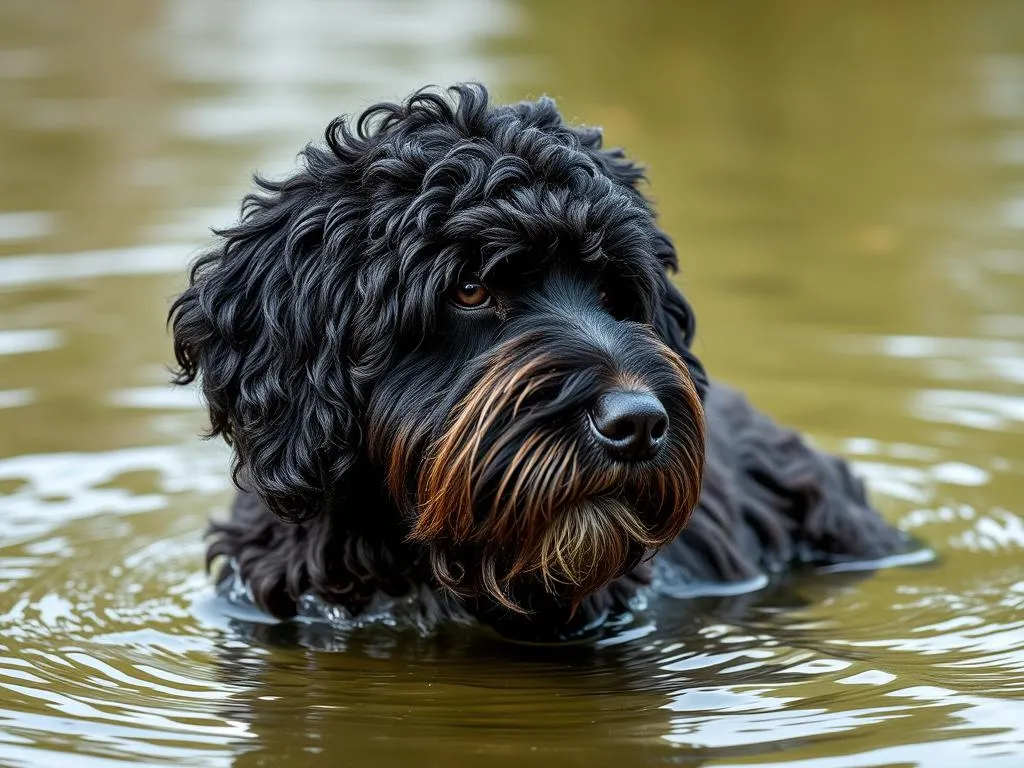
Introduction
The Portuguese Water Dog (PWD) is a breed that has captured the hearts of dog lovers worldwide with its unique characteristics and rich history. Originating from Portugal, these dogs were initially bred to assist fishermen by retrieving nets and catching fish, making them excellent working companions in maritime activities.
Before deciding to welcome a Portuguese Water Dog into your home, it’s essential to weigh the pros and cons associated with this breed. Understanding their needs and traits can help you make an informed decision about whether this energetic and affectionate breed is the right fit for you and your lifestyle.
History and Characteristics of the Portuguese Water Dog
Historical Background
The Portuguese Water Dog has a fascinating history that dates back centuries. Known as “Cão de Água,” these dogs were developed in Portugal to assist fishermen in various tasks, including retrieving lost gear and catching fish. Their natural affinity for water and strong swimming abilities made them invaluable companions on fishing vessels.
Recognized by kennel clubs such as the American Kennel Club (AKC) in 1983, the Portuguese Water Dog has transitioned from a working dog to a beloved family pet. Their contributions to maritime culture have solidified their place in history and made them a popular choice for those seeking an active and intelligent companion.
Physical Characteristics
The Portuguese Water Dog is a medium-sized breed, typically weighing between 35 to 60 pounds and standing about 17 to 23 inches tall at the shoulder. They have a distinctive curly or wavy coat that is water-resistant, which aids them in their original role as water retrievers. Their coat comes in various colors, including black, white, and brown, often with unique markings.
Grooming is an essential aspect of owning a Portuguese Water Dog, as their curly coat requires regular brushing to prevent matting. Typically, a professional groomer is recommended every 4 to 6 weeks to maintain their coat’s health and appearance.
Temperament and Behavior
The temperament of the Portuguese Water Dog is one of its most appealing attributes. These dogs are known for being intelligent, loyal, and friendly. They tend to bond closely with their families and thrive on human interaction. Their playful nature makes them a great fit for families with children and other pets, as they are generally gentle and adaptable.
In terms of trainability, the PWD excels due to its high intelligence. They are eager to learn and respond well to positive reinforcement, although some individuals may display a stubborn streak. Early socialization and training are crucial to ensure they develop into well-rounded companions.
Pros of Owning a Portuguese Water Dog
Great Companionship
One of the most significant pros of owning a Portuguese Water Dog is their affectionate and loyal nature. They form strong bonds with their families and thrive on companionship. Their playful demeanor makes them great playmates for children and an excellent addition to multi-pet households.
High Intelligence
The Portuguese Water Dog is known for its high intelligence, which translates into quick learning abilities. This breed is well-suited for various dog sports and activities, such as agility, obedience, and even water sports. Their intelligence also means they can be trained to perform a variety of tasks, making them excellent service and therapy dogs.
Energetic and Playful
These dogs are energetic and require regular physical activity to stay happy and healthy. They enjoy engaging in outdoor activities, especially those involving water. Whether it’s swimming, fetching a ball, or playing in the park, the PWD thrives on playtime and exercise, making them a great choice for active families.
Hypoallergenic Coat
For allergy sufferers, one of the standout pros of the Portuguese Water Dog is its hypoallergenic coat. Unlike many breeds, they shed minimally, which can help reduce allergens in the home. This characteristic makes them an appealing option for families with members who have allergies.
Versatile Working Dog
The PWD has a rich history as a working dog, primarily in fishing activities. Today, they continue to excel in various roles, including therapy, assistance, and search-and-rescue. Their adaptability and eagerness to work make them suitable for numerous tasks, showcasing their versatility beyond being just a pet.
Cons of Owning a Portuguese Water Dog
High Energy Requirements
While the high energy level of the Portuguese Water Dog can be a pro, it also presents a significant con. These dogs require regular exercise and mental stimulation to prevent boredom, which can lead to destructive behavior. Prospective owners should be prepared to dedicate time to daily walks, play sessions, and engaging activities.
Grooming Needs
Owning a Portuguese Water Dog comes with the responsibility of maintaining their beautiful coat. Regular grooming is essential to keep their curly or wavy fur healthy and free from mats. This means frequent brushing at home and professional grooming every few weeks, which can be time-consuming and costly.
Training Challenges
Although the PWD is intelligent, some individuals may display stubbornness, making training a challenge. Early socialization and consistent training are vital to curb any behavioral issues. Prospective owners should be prepared for the commitment required to train and socialize their Portuguese Water Dog effectively.
Separation Anxiety
Another potential con is the tendency for Portuguese Water Dogs to experience separation anxiety if left alone for extended periods. This breed thrives on human interaction and may become anxious or destructive when isolated. It’s essential to provide them with plenty of companionship, and if necessary, to consider crate training or other strategies to manage their anxiety.
Health Concerns
As with any breed, the Portuguese Water Dog is prone to certain health issues. Common concerns include hip dysplasia, progressive retinal atrophy, and certain skin conditions. Regular veterinary check-ups and preventive care are crucial to ensure the health and well-being of your dog.
Ideal Environment for a Portuguese Water Dog
Living Conditions
The Portuguese Water Dog is best suited for active families or individuals who can provide the exercise and stimulation this breed requires. They thrive in homes with ample space to run and play, making them less ideal for apartment living unless the owner is committed to regular outdoor activities. A home with a fenced yard is ideal, providing a safe space for them to explore and play.
Socialization Needs
Early socialization is critical for a Portuguese Water Dog. Introducing them to various people, environments, and other animals helps ensure they develop into well-adjusted adults. Enrolling in puppy socialization classes can provide valuable experiences and teach essential manners and skills.
Conclusion
In summary, the Portuguese Water Dog offers a mix of delightful traits and challenges. They are intelligent, loyal, and energetic companions that excel in various roles, from family pets to working dogs. However, their high energy levels, grooming needs, and potential for separation anxiety are important factors to consider.
Ultimately, the decision to bring a Portuguese Water Dog into your life should be based on your lifestyle, environment, and commitment to meeting their needs. If you’re ready for an active and engaging companion, the Portuguese Water Dog may be the perfect addition to your family.
FAQs
What is the average lifespan of a Portuguese Water Dog?
The average lifespan of a Portuguese Water Dog is typically between 12 to 14 years, making them a relatively long-lived breed. Regular veterinary care and a healthy lifestyle can contribute to a longer, healthier life.
Are Portuguese Water Dogs good for first-time dog owners?
While Portuguese Water Dogs can be a good fit for first-time dog owners, they require consistent training and socialization. An owner willing to invest time and effort into training and exercise will find this breed to be a rewarding companion.
How much exercise does a Portuguese Water Dog need daily?
A Portuguese Water Dog requires at least 60 to 90 minutes of exercise each day. This can include walks, playtime, and engaging activities that stimulate both their physical and mental well-being.
What are the most common health issues in Portuguese Water Dogs?
Common health issues in Portuguese Water Dogs include hip dysplasia, progressive retinal atrophy, and certain skin allergies. Regular veterinary check-ups and a healthy diet can help mitigate these issues.









